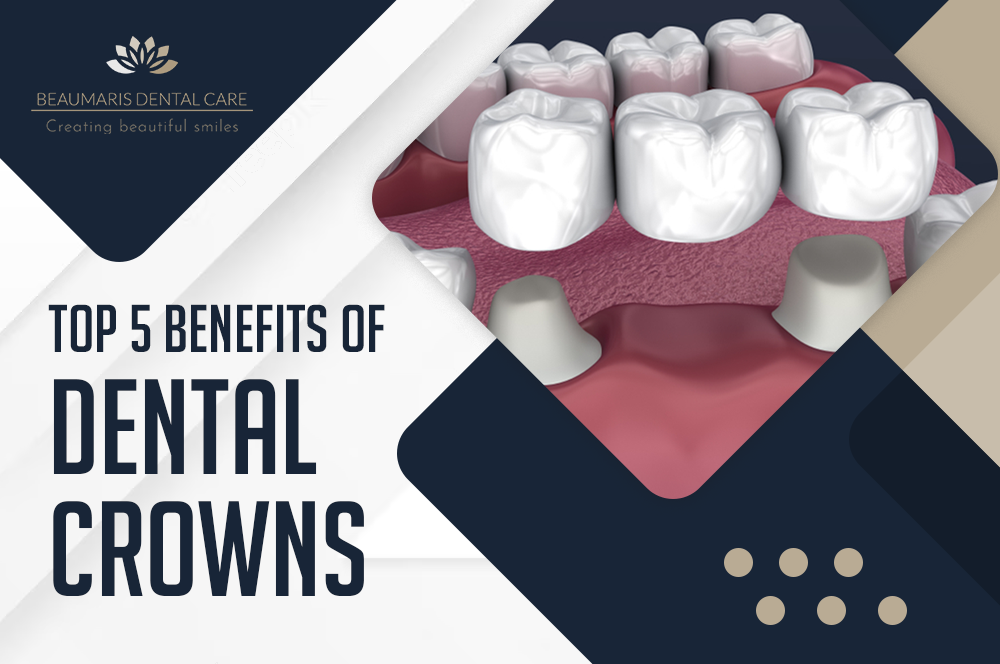Top 5 Benefits of Dental Crowns You Shouldn’t Ignore
Do you often hide your smile due to a cracked or discoloured tooth? Well, fret no more! Dental crowns
are here to save the day and restore your confidence. Not only do these little marvels improve your
appearance, but they also offer numerous other benefits that you can't ignore. From enhancing tooth
strength to preventing further damage, join us as we unveil the top five advantages of dental crowns that
will make you smile wider than ever!

-
Introduction to Dental Crowns
Dental crowns are one of the most popular dental procedures. They are also known as caps. A dental crown is a hollow, cylindrical tooth-shaped covering placed over an existing tooth. The purpose of a dental crown is to restore the function and appearance of a damaged or misshapen tooth.
Dental crowns are made from various materials, including porcelain, ceramic, metal, and composite resin. Porcelain and ceramic crowns are the most popular dental crowns because they look like natural teeth. Metal crowns are less visible but stronger than porcelain and ceramic crowns. Composite resin crowns are made from a mixture of plastic and glass particles. They are less expensive than porcelain and ceramic crowns.
-
Top 5 Benefits of Dental Crowns
Dental crowns are one of the most popular dental procedures. They restore the function and appearance of
a tooth damaged by decay. There are many benefits of dental crowns, but here are the top five:
- Dental crowns can strengthen a tooth weakened by decay or injury.
- Dental crowns can improve the appearance of a tooth that is discoloured or misshapen.
- Dental crowns can protect a tooth from further damage.
- Dental crowns can help support a tooth damaged.
- Dental crowns can help to improve the function of a tooth that has been damaged by decay or injury
-
Strengthen Weak or Damaged Teeth
When a tooth is damaged or weakened, it can be difficult to chew and put additional stress on the other teeth. A dental crown can strengthen a weak or damaged tooth, making it easier to chew and putting less pressure on the other teeth.
Dental crowns are also used to protect a tooth that has been damaged or is at risk of being hurt. For example, if you have a tooth that is cracked or chipped, a dental crown can help to prevent further damage.
Dental crowns can also be used to improve the appearance of your smile. If you have a misshapen or discoloured tooth, a dental crown can help to improve its appearance.
If you are considering dental crowns for any of these reasons, it is important to talk to your dentist about
whether they are the right option.
-
Improve the Appearance of Your Smile
One of the many benefits of dental crowns is that they can improve the appearance of your smile. If you have damaged, discoloured, or misshapen teeth, crowns can help restore your smile and give you the confidence to show your teeth again. In addition, if you have gaps in your teeth, crowns can be used to close those gaps and give you a more uniform smile.
-
Restore Chewing Function
If you have lost teeth or have had them extracted, you know how important it is to have a complete set of
teeth. Not only are they essential for eating and speaking correctly, but they also play a role in your
overall health. When you lose teeth, the bone in your jaw begins to deteriorate, which can lead to further
tooth loss and even change the shape of your face.
Dental crowns can help restore chewing function by replacing missing teeth and supporting the
surrounding teeth. Crowns can also protect damaged teeth from further wear and tear. They are made
from durable materials that can last many years with proper care.
-
Prevent Further Damage
If you have a tooth that is severely decayed or damaged, a dental crown can help to prevent further damage. Covering the tooth protects the crown from further decay or injury. In addition, a dental crown can also improve the appearance of your smile by hiding any unsightly damage.
-
Last for Years with Proper Care
A dental crown can last many years, but it depends on how well you care for it. Brushing and flossing regularly will help keep your crown clean and prevent decay. Avoid chewing hard foods or using your teeth as tools, as this can damage the crown. See your dentist regularly for checkups and cleanings, and if you have any problems with your crown, be sure to see your dentist immediately.
-
How Much Do Dental Crowns Cost?
Dental crowns are an effective way to restore the function and appearance of your teeth. They can treat dental problems, including tooth decay, cracked or chipped teeth, misshapen teeth, and more. While dental crowns are a significant investment, they offer many benefits that make them worth the cost.
The cost of dental crowns varies depending on the materials used and the complexity of the procedure.
However, the cost may be higher or lower depending on your situation.
-
What to Expect During and After Treatment
It's no secret that dental crowns can offer several benefits for your smile. But what exactly can you expect during and after treatment? Here's a look at what you can expect from start to finish:
During treatment, your dentist will first prepare your tooth by removing any decay or damaged tissue.
Once your tooth is ready, they will take an impression of your teeth to create a custom-fit crown. In some
cases, you may get a same-day crown. Otherwise, your permanent crown usually takes 1-2 weeks.
Once your permanent crown is ready, you'll return for a second appointment to have it placed. Your
dentist will ensure the fit is perfect and make necessary adjustments before cementing it. You may
experience some sensitivity immediately after treatment, but this should subside within a few days.
In the weeks and months following treatment, you'll be able to enjoy all the benefits dental crowns offer!
Your tooth will be better protected from decay and damage, and you can confidently show off your
beautiful new smile!
-
Conclusion
Dental crowns have many benefits and can be an excellent choice for restoring damaged teeth. From improved aesthetics to better stability, dental crowns can help improve the strength and appearance of your smile. With regular checkups and good oral hygiene, you can maintain the lifespan of a dental crown for years to come. If you're considering getting one or more dental crowns, you must talk with your dentist about all the potential benefits and risks before making any decisions.
Experience the difference at Beaumaris Dental Care, which provides dental care in Brampton and let us
be your partner in achieving the healthy, beautiful smile you deserve. Schedule an appointment with us
today and take the first step towards a lifetime of exceptional oral health.
Recent Posts
- Urgency and Care: Navigating Dental Emergencies with Beaumaris Dental Care in Brampton
- Smile Bright with Beaumaris Dental Care: Your Trusted Dentists in Brampton
- A Comprehensive Guide to Root Canal Treatment – Benefits, Symptoms and Procedure
- Unlocking the Secrets of Dental Cleaning at Beaumaris Dental Care: A Gateway to Oral Health
- The Ultimate Guide to Professional Teeth Whitening Services
- Why Choose Beaumaris Dental Care for Your Oral Health Needs in Brampton
- Top 5 Benefits of Dental Crowns You Shouldn’t Ignore
- Transform Your Smile with Porcelain Veneers: A Step-by-Step Process
- The Importance of Regular Dental Checkups: A Comprehensive Guide
- The Importance of Emergency Dental Services: Why Immediate Care is Crucial
- Advantages and Long-Term Benefits of Tooth-Colored Fillings: A Brighter, Confident Smile!
- What is Root Canal Treatment and When it is Required?
- Dental Implants: Why Implants Are Better Solution for Missing Teeth?
- Benefits of Zoom Teeth Whitening
- Is Clear Braces Effective in Fixing the Teeth Gaps?
- 7 things you should keep in mind before choosing the right dentist
- Dental Bridges: Your Missing Teeth Are Not Forever
- Things You Should Know Before Getting a Tooth Extraction
- Why a dental implant surgery shouldn’t get you nervous
- Are Regular Dental Checkups Really Necessary ?
The first step in getting a porcelain veneer procedure is to consult a dentist to see if you're a candidate for the course. During the consultation, your dentist will examine your mouth and take X-rays and digital images to determine if you have enough tooth enamel for the procedure. Your dentist will also evaluate your bite and check for gum disease. If you have any of these conditions, they must be treated before you can get porcelain veneers.


